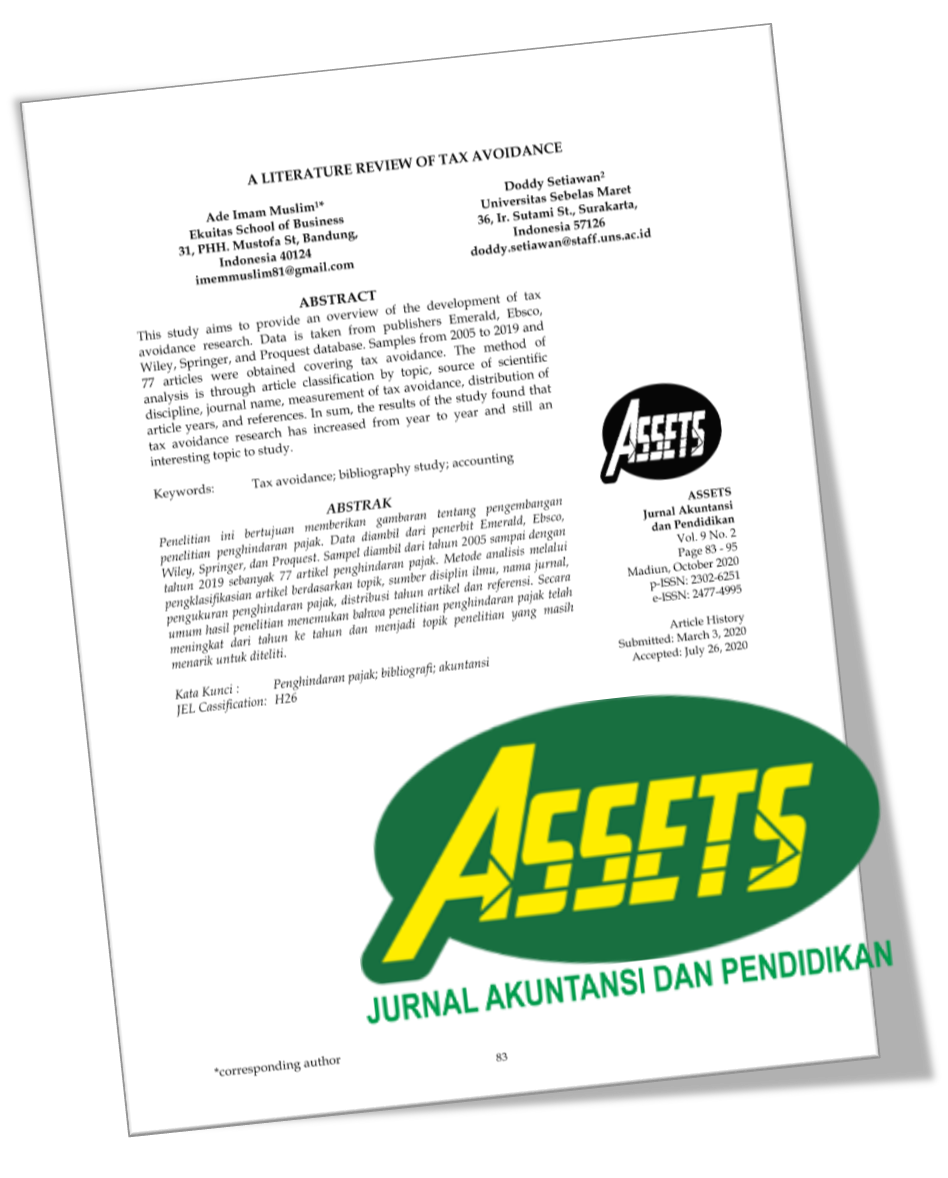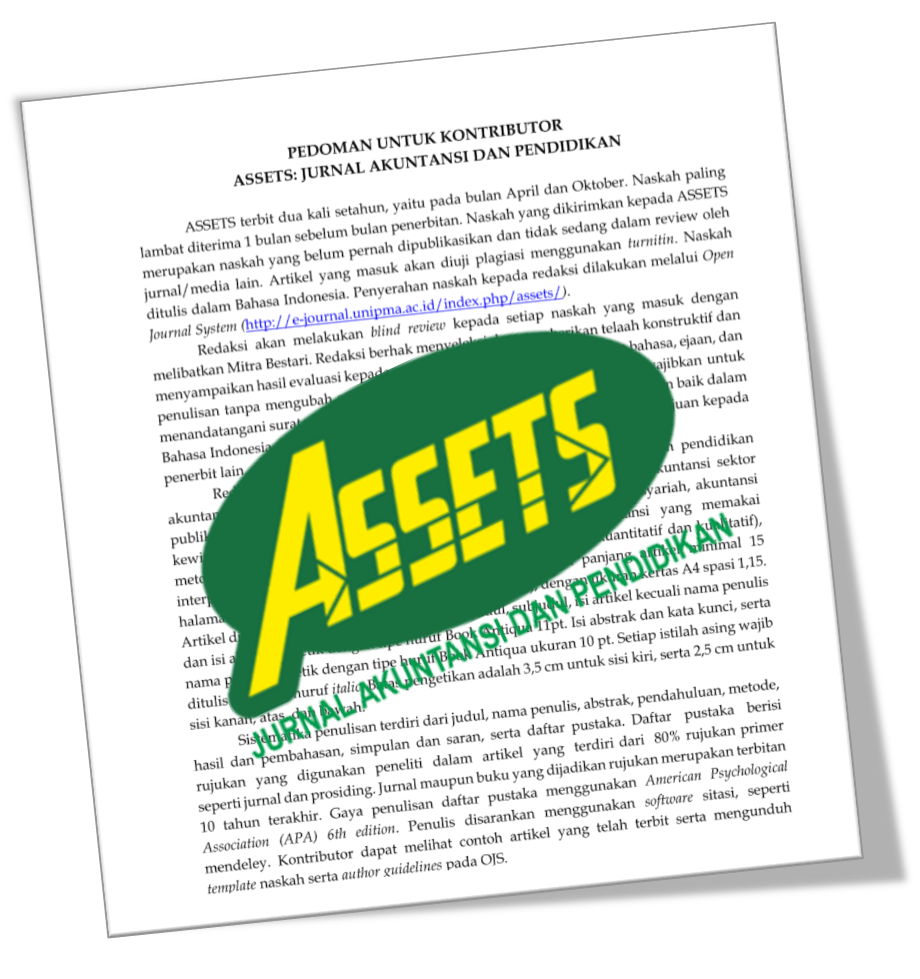Pengampunan Pajak Berulang dan Kepastian Hukum dalam Kepatuhan Pajak di Indonesia: Sebuah Quasi Eksperimen
DOI:
https://doi.org/10.25273/jap.v8i2.4189Keywords:
Pengampunan Pajak, Kepastian Hukum, Kepatuhan Pajak, Tax Amnesty, Legal Certainty, Tax ComplianceAbstract
ABSTRAK
Pengampunan pajak telah dilakukan berulang kali di Indonesia yaitu 1964, 1989, 2008 dan 2016. Penelitian ini menguji apakah ada perbedaan kepatuhan pajak antara yang mengetahui pengampunan pajak berulang serta merasakan kepastian penegakan hukum dan yang tidak. Penelitian ini menggunakan quasi eksperimen faktorial 2 x 2 antarsubyek dengan mahasiswa akuntansi di FEB yang sedang mengambil matakuliah manajemen pajak sebagai partisipan. Hasil dari penelitian ini adalah terdapat pengaruh antara pengetahuan tentang pengampunan pajak berulang maupun kepastian penegakan hukum terhadap kepatuhan pajak. Hasil dari pengujian interaksi yang diperoleh adalah ketika wajib pajak tidak mengetahui adanya pengampunan pajak yang berulang dan merasakan kepastian penegakan hukum yang tinggi akan menghasilkan kepatuhan yang paling tinggi. Sebaliknya ketika wajib pajak mengetahui adanya pengampunan pajak yang berulang dan tidak merasakan kepastian penegakan hukum yang tinggi akan menghasilkan kepatuhan yang rendah.
ABSTRACT
Tax amnesty has been repeadly implemented in Indonesia namely 1964,1989, 2008 and 2016.The purpose of the study is to examine is there any tax compliance differences between those who perceive recurring tax amnesty and feel legal certainty and to those who do not. This quasi experiment design was consisted of 2x2 between subject factorial design, with Bachelor’s Degree of Accountancy at FEB UKSW who took Taxation Management as participants. The result shown that there is influence between recurring tax amnesty knowledge and legal certainty in the tax compliance. The result of the interaction testing shown that when taxpayer are not aware of any recurring tax amnesty and feel the high legal certainty will result high compliance. Conversely, when taxpayers know that there is recurring tax amnesty and do not sense a high level certainty, it would result a low tax compliance.
Downloads
References
Bagiada, I. M., & Darmayasa, I. N. (2016). Tax Amnesty Upaya Membangun Kepatuhan Sukarela. In Simposium Nasional Akuntansi Vokasi V, 1–24.
Birskyte, L. (2015). The Impact of Trust in Government on Tax Paying Behavior of Nonfarm Sole Proprietors. Economic Science, 61(1), 1–15.
Clark, J., Friesen, L., & Muller., R. A. (2004). The good, the bad, and the regulator: An experimental test of two conditional audit schemes. Economic Inquiry, 42(1), 69–87.
Damayanti, T. W., Sutrisno, Subekti, I., & Baridwan, Z. (2015). The role of taxpayer’s perception of the government and society to improve tax compliance. Accounting and Finance Research, 4(1), 180–191.
Darussalam, D. (2016). Pentingnya Peran Tax Amnesty. Inside Tax, 16, 1–2.
Dijke, V., & Verboon, P. (2010). Trust in authorities as a boundary condition to procedural fairness effects on tax compliance. Journal of Economic Psychology, 31, 80–91.
Doran, M. (2009). Tax penalties and tax compliance. Harvard Journal on Legislation, 46, 111–161.
Fajar, C. M. (2014). Tax Law Enforcement Sebagai Upaya Optimalisasi Penerimaan Pajak Negara Ditinjau Melalui Tingkat Kepatuhan Wajib Pajak. Ecodemica, 2, 194–210.
Gangl, K., Hofmann, E., & Kirchler, E. (2015). Tax authorities’ Interaction with Tax Payers: A Conception of Compliance in Social Dilemmas by Power and Trust. New Ideas In Psychology, 37, 13–23.
Gangl, K., Hofmann, E., Pollai, M., & Kirchler, E. (2013). The Dynamics of Power and Trust in the slippery Slope Framework and its Impact on the Tax Climate. SSRN Working Paper, No. 2024946.
Gerger, G. C. (2012). Tax Amnesties and Tax Complience in Turkey. International Journal of Multidisciplinary Thought, 2(3), 107–113.
Gunawan, A., & Sukartha, I. M. (2016). Pengaruh Persepsi Tax Amnesty, Pertumbuhan Ekonomi dan Transformasi Kelembangaan Direktorat Jenderal Pajak pada Penerimaan Pajak. E-Jurnal Akuntansi Universitas Udayana, 2036–2060.
Hasanah, N., Khafid, M., & Anisykurlillah, I. (2014). Kepatuhan Wajib Pajak UMKM Di Kabupaten Jepara. Accounting Analysis Journal, 3(2), 168–176.
Hoffmann, E., Gagl, K., Kirchler, E., & Stark, J. (2014). Enhanching Tax Compliance trough Coercive and Legitimate Power of Tax Authorities by Concurrently Diminishing of Facilitating Trust in Tax Authorities. Law and Policy, 36(3), 290–313.
Jatmiko, A. N. (2006). Pengaruh sikap wajib pajak pada pelaksanaan sanksi denda, pelayanan fiskus dan kesadaran perpajakan terhadap kepatuhan wajib pajak (Studi empiris terhadap wajib pajak orang pribadi di kota semarang).
Junpath, S. V, Kharwa, M. S. E., & Stainbank, L. J. dan. (2016). Taxpayers’attitudes towards tax Amnestiesand compliance inSouth Africa: An exploratory study. South African Journal of Accounting Research, 30(2), 97–119.
Kirchler, Erich, Muehlbacher, S., Kastlunger, B., & Wahl, I. (2010). Why pay taxes: A review on tax compliance decision.
Kogler, C., Muehlbacher, S., & Kirchler, E. (2015). Trust, power, and tax compliance: Testing the “slippery slope framework†among self-employed taxpayers. Economics of Governance, 16(2), 125–142.
Lisi, G. (2014). The interaction between trust and power: Effects on tax compliance and macroeconomic implications. Journal of Behavioral and Experimental Economics, 53, 24–33.
Loo, E. C., Evans, C., & McKerchar, M. (2010). Challenges in understanding compliance behaviour of taxpayers in Malaysia. Asian Journal of Business and Accounting, 3(2), 145–161. https://doi.org/10.2139/ssrn.2128378
Muehlbacher, S., & Kirchler, E. (2010). Tax Compliance by Trust and Power of uthorities. International Economic Journal, 24(4), 607–610.
Portillo, J., & Block, W. E. (2012). Negative Effects of US Taxation. Studies in Economics and Finance, 29(2), 76–88.
Prinz, A., Muehlbacher, S., & Kirchler, E. (2014). The Slippery Slope Framework on Tax Compliance: An Attempt to Formalization. Journal of Economic Psychology, 40(1), 20–34.
Ragimun. (2015). Analisis Implementasi Pengampunan Pajak (Tax Amnesty) Di Indonesia. Diunduh Www.kemenkeu.go.id.
Rahayu, Y. N. (2019). Tax Amnesty: Why Is It Behavior Compliance? Journal of Applied Management, 17(3), 442–450.
Ratmono, D., & Cahyonowati, N. (2013). Kepercayaan Terhadap Otoritas Pajak sebagai Pemoderasi Pengaruh Deterrence Factor Terhadap Kepatuhan Wajib Pajak Pribadi. Jurnal Akuntansi Indonesia, 2, 1–15.
Razak, A. A., & Adafula, C. J. (2013). Evaluating taxpayers attitude and its influence on tax compliance decisions in Tamale, Ghana. Journal of Accounting and Taxation, 5(3), 48–57. https://doi.org/10.5897/jat2013.0120
Rechberger, S., Hartner, M., Kirchler, E., & Hammerle, F. K. (2010). Tax Amnesties, Justice Perceptions, and Filing Behavior: A Simulation Study. Law & Policy, 32, 214–245.
Saracoglu, O. F., & Caskurlu, E. (2011). Tax Amnesty with Effects and Effecting Aspects: Tax Compliance, Tax Audits and Enforcements Around The Turkish Case. International Journal of Business and Social Science, 95–103.
Saunders, M., Lewis, P., & Thornhill, N. (2016). Research Methods for Business Students.
Smith, M. (2003). Research Method In accounting.
Tanko, M. B. (2015). Tax Law Enforcement: Practice and Procedure. Research Journal of Finance and Accounting, 143–147.
T W Damayanti, T. W., & Martono, S. (2018). Taxpayer Compliance, Trust, and Power. Jurnal Keuangan Dan Perbankan, 22(2), 231–240.
Trivedi, & Shehata. (2005). Attitudes, incentives, and tax compliance. Journal of Economic Psychology, 5, 371–384.
Wahl, Ingrid, Kastlunger, B., & Kirchler, E. (2010). Trust in authorities and power to enforce tax compliance: An empirical analysis of the slippery slope framework. Journal of Law and Policy, 32(4), 383–406. https://doi.org/https://doi.org/10.1111/j.1467-9930.2010.00327.x 406.
Downloads
Additional Files
Published
Issue
Section
License
Perjanjian Lisensi dan Hak Cipta
Saat mengirimkan naskah ke jurnal, penulis menyatakan bahwa:
- Mereka diberi wewenang oleh rekan penulisnya untuk masuk ke dalam perjanjian ini.
- Karya yang dimaksud belum pernah diterbitkan secara resmi sebelumnya, kecuali dalam bentuk abstrak atau sebagai bagian dari kuliah, resensi, tesis, atau overlay jurnal yang diterbitkan.
- Karya yang dimaksud tidak sedang dipertimbangkan untuk diterbitkan di tempat lain,
- Publikasi karya yang dimaksud telah disetujui oleh semua penulis dan oleh otoritas yang bertanggung jawab - secara tahu sama tahu atau eksplisit - dari lembaga tempat pekerjaan itu dilakukan.
- Mereka mengamankan hak untuk mereproduksi materi apa pun yang telah diterbitkan atau dilindungi hak cipta di tempat lain.
- Mereka menyetujui lisensi dan perjanjian hak cipta berikut.
Hak Cipta
Penulis yang menerbitkan dengan ASSETS: Jurnal Akuntansi dan Pendidikan menyetujui persyaratan berikut:
- Penulis mempertahankan hak cipta dan memberikan jurnal hak publikasi pertama dengan karya yang secara bersamaan dilisensikan di bawah Lisensi Atribusi Creative Commons (CC BY-SA 4.0) yang memungkinkan orang lain untuk berbagi karya dengan pengakuan kepenulisan karya dan publikasi awal di jurnal ini.
- Penulis dapat masuk ke dalam pengaturan kontrak tambahan yang terpisah untuk distribusi non-eksklusif dari versi jurnal yang diterbitkan dari karya tersebut (misalnya, mempostingnya ke repositori institusional atau menerbitkannya dalam sebuah buku), dengan pengakuan publikasi awalnya di jurnal ini.
- Penulis diizinkan dan didorong untuk memposting karya mereka secara daring (misalnya di repositori institusional atau di situs web mereka) sebelum dan selama proses pengiriman, karena dapat menghasilkan pertukaran yang produktif, serta kutipan lebih awal dan lebih besar dari karya yang diterbitkan.
License and Copyright Agreement
In submitting the manuscript to the journal, the authors certify that:
- Their co-authors authorize them to enter into these arrangements.
- The work described has not been formally published before, except as an abstract or part of a published lecture, review, thesis, or overlay journal.
- That it is not under consideration for publication elsewhere,
- That its publication has been approved by all the author(s) and by the responsible authorities – tacitly or explicitly – of the institutes where the work has been carried out.
- They secure the right to reproduce any material already published or copyrighted elsewhere.
- They agree to the following license and copyright agreement.
Copyright
Authors who publish with ASSETS: Jurnal Akuntansi dan Pendidikan agree to the following terms:
- Authors retain copyright and grant the journal right of first publication with the work simultaneously licensed under a Creative Commons Attribution License (CC BY-SA 4.0) that allows others to share the work with an acknowledgment of the work's authorship and initial publication in this journal.
- Authors can enter into separate, additional contractual arrangements for the non-exclusive distribution of the journal's published version of the work (e.g., post it to an institutional repository or publish it in a book), with an acknowledgment of its initial publication in this journal.
- Authors are permitted and encouraged to post their work online (e.g., in institutional repositories or on their website) before and during submission, as it can lead to productive exchanges and earlier and more extraordinary citations of published work.

ASSETS: Jurnal Akuntansi dan Pendidikan is licensed under a Creative Commons Attribution-ShareAlike 4.0 International License.










